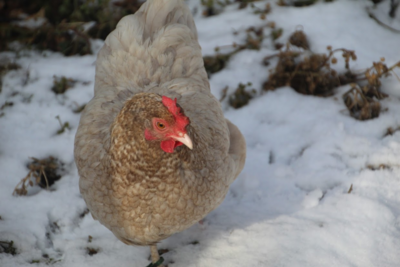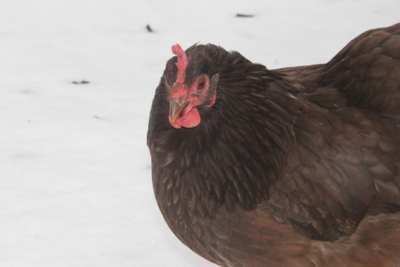As it nears winter, the new chicken keepers start to panic. "How will my chickens survive the cold?" "Do I need a heat lamp?" "Are there any cracks in my coop?"
Don't worry, there are lots of tricks to help your chickens stay warm in the winter. Here is my way of overwintering chickens; natural, simple, and cheap (or should I say "cheep"?).
Good Ventilation
You might think that cold air coming in through the cracks in your coop will make your chickens freeze, but really, no cracks is the worst thing you can do.
If there are no cracks, the moisture from the chickens' droppings can not escape outside. This will make the coop humid and the chickens will get damp. If the chickens get wet, they will get frostbite and possibly freeze to death.
Bad ventilation also makes the air stale and dusty, which isn't very nice to breath Make sure to give your coop more ventilation than you think it needs.
For more information, please read: Chicken Coop Ventilation - Go Out There And Cut More Holes In Your Coop!
Why I Don't Use Heat lamps
1. Heat lamps are fire hazards. After reading this section, if you still want to use a heat lamp please just make sure it is very secure.
2. Chickens need a break from egg laying every once in a while. If you force them to lay year-round by lighting the coop with a lamp, it will shorten your chickens' lives and make them unhappy. Chickens aren't meant to lay year-round.
3. If the power were to suddenly go out in the middle of winter, the chickens--who are used to the extra heat--would freeze to death.
4. They don't need it. Fully-feathered chickens can survive if you let them ease naturally into winter like the wild birds. They will grow more down (feathers) to keep them warm.
5. If you're okay with a lower egg production, and know your chickens won't freeze, then what use is the heat lamp? They use electricity, which can get expensive.
The Deep Litter Method
I use the Deep Litter Method (DLM) in the winter. This is a simple way to keep your coop warmer by natural methods.
How to do it:

Mountain forest after a snowstorm
Fresh, Unfrozen Water
Water is important to all living things. A chicken's body is 65-70 percent water and the egg is at least 80 percent water. The amount of water a chicken needs to drink per day depends on the weather, the age of the chicken, whether the chicken is laying or not, and the chicken in general. They should always be provided with fresh water, and in the winter is should always be unfrozen.
In the old days, chickens used to drink from either a nearby creek or ditch, or from the horses and cows' troughs. Because troughs are so big they didn't freeze most days, and when they did the farmer would crack the ice a couple times a day. Or they would eat clean snow off the ground.
For most people ditches and troughs are not an option, me included. In warmer climates a rubber bucket can keep most ice off the water, but it is not so effective in colder areas. I have also heard that ducks will splash enough to keep ice from forming on the water. And if your area is like mine and gets cold but not very snowy, it is not smart to use snow as your chickens' only waters source.
To be honest, my previous way of keeping water from freezing was not natural. I used an electric bird bath heater. But this year I am testing out a new method. It involves burying a water bucket in manure or chicken droppings. That's it, so simple. You can find the method here: Alternate method to prevent water freezing.
I have heard of similar methods used for winter gardening so am very confident that this method will work.
Cold-hardy Breeds
If you are still worried about your chickens, or live in an especially cold area, you could try getting cold-hardy breeds of chickens. Some cold-hardy breeds are:

Bantam Orpington
Extra Notes

If you follow these tips, your chickens will be healthy and happy all winter!
Don't worry, there are lots of tricks to help your chickens stay warm in the winter. Here is my way of overwintering chickens; natural, simple, and cheap (or should I say "cheep"?).
Good Ventilation
You might think that cold air coming in through the cracks in your coop will make your chickens freeze, but really, no cracks is the worst thing you can do.
If there are no cracks, the moisture from the chickens' droppings can not escape outside. This will make the coop humid and the chickens will get damp. If the chickens get wet, they will get frostbite and possibly freeze to death.
Bad ventilation also makes the air stale and dusty, which isn't very nice to breath Make sure to give your coop more ventilation than you think it needs.
For more information, please read: Chicken Coop Ventilation - Go Out There And Cut More Holes In Your Coop!
Why I Don't Use Heat lamps
1. Heat lamps are fire hazards. After reading this section, if you still want to use a heat lamp please just make sure it is very secure.
2. Chickens need a break from egg laying every once in a while. If you force them to lay year-round by lighting the coop with a lamp, it will shorten your chickens' lives and make them unhappy. Chickens aren't meant to lay year-round.
3. If the power were to suddenly go out in the middle of winter, the chickens--who are used to the extra heat--would freeze to death.
4. They don't need it. Fully-feathered chickens can survive if you let them ease naturally into winter like the wild birds. They will grow more down (feathers) to keep them warm.
5. If you're okay with a lower egg production, and know your chickens won't freeze, then what use is the heat lamp? They use electricity, which can get expensive.
The Deep Litter Method
I use the Deep Litter Method (DLM) in the winter. This is a simple way to keep your coop warmer by natural methods.
How to do it:
- Don't clean the droppings and old bedding out of your coop
- Add new bedding about once a month (once again, don't take out the old stuff)
- Stir the bedding every few days. This mixes the bedding and droppings, and lets them compost. The compost will give out heat and warm your coop
- I have heard that the DLM is not very smelly. But because I have a terrible sense of smell I can't confirm this.
- *Makes coop maintenance in the winter much easier; who likes cleaning out all the muck during a snow flurry?*

Mountain forest after a snowstorm
Fresh, Unfrozen Water
Water is important to all living things. A chicken's body is 65-70 percent water and the egg is at least 80 percent water. The amount of water a chicken needs to drink per day depends on the weather, the age of the chicken, whether the chicken is laying or not, and the chicken in general. They should always be provided with fresh water, and in the winter is should always be unfrozen.
In the old days, chickens used to drink from either a nearby creek or ditch, or from the horses and cows' troughs. Because troughs are so big they didn't freeze most days, and when they did the farmer would crack the ice a couple times a day. Or they would eat clean snow off the ground.
For most people ditches and troughs are not an option, me included. In warmer climates a rubber bucket can keep most ice off the water, but it is not so effective in colder areas. I have also heard that ducks will splash enough to keep ice from forming on the water. And if your area is like mine and gets cold but not very snowy, it is not smart to use snow as your chickens' only waters source.
To be honest, my previous way of keeping water from freezing was not natural. I used an electric bird bath heater. But this year I am testing out a new method. It involves burying a water bucket in manure or chicken droppings. That's it, so simple. You can find the method here: Alternate method to prevent water freezing.
I have heard of similar methods used for winter gardening so am very confident that this method will work.
Cold-hardy Breeds
If you are still worried about your chickens, or live in an especially cold area, you could try getting cold-hardy breeds of chickens. Some cold-hardy breeds are:
- Orpingtons
- Brahmas
- Wyandottes
- Australorps
- Buckeyes
- Cochins
- Dominiques
- Faverolles
- Chanteclers
- Sussex

Bantam Orpington
Extra Notes
- Some people may be wondering if they should insulate their coops. I don't have any experience with this, so I'm going to direct you to this article: To Insulate or Not to Insulate...
- More chickens means more body heat. I always make sure my chickens are sleeping in one or sometimes two coops, depending on how many chickens have at the time.
- In cold and damp climates, I recommend using flat two-by-fours as perches. This helps prevent your chickens' toes from getting frostbite because they can cover their feet with their fluff easier.
- Also in cold and damp climates, you can get breeds that have smaller combs so their combs are less likely get frostbite.
- For future reading, I recommend: Kuntry Klucker's Hacks for Surviving Old Man Winter., Chickens & Winter Egg Laying and Lighting, and Winter Chicken Keeping.

If you follow these tips, your chickens will be healthy and happy all winter!


